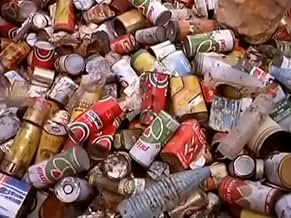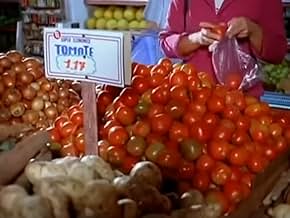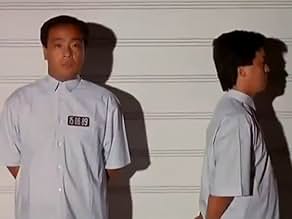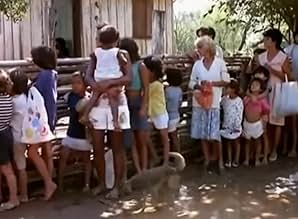IMDb-BEWERTUNG
8,5/10
6876
IHRE BEWERTUNG
Füge eine Handlung in deiner Sprache hinzuA tomato is planted, harvested, transported and sold in a supermarket, but it rots and ends up in the trash. The film follows it to its true end, all to make clear the difference between tom... Alles lesenA tomato is planted, harvested, transported and sold in a supermarket, but it rots and ends up in the trash. The film follows it to its true end, all to make clear the difference between tomatoes, pigs, and human beings.A tomato is planted, harvested, transported and sold in a supermarket, but it rots and ends up in the trash. The film follows it to its true end, all to make clear the difference between tomatoes, pigs, and human beings.
- Regie
- Drehbuch
- Hauptbesetzung
- Auszeichnungen
- 4 wins total
Empfohlene Bewertungen
Saw this documentary short subject in my World Society course at UC Santa Cruz. It's about capitalism, told through the story of a tomato. But, thinking back on it, it was much more than just that tomato, that went into the making of the family's dinner, which was bought with money, which was acquired through the mother's perfume sales, which is an alcohol-based topical fragrance oil. If you're wondering what I'm talking about, this is how the film is paced. It is the very reason the word "Tangential" was created. Furtado is so crafty at taking you to places you never think you'll go; from painfully hilarious irony (the monty python-esque first 5 minutes), to head-battering shock (the history of "the second");just by mentioning a single word, you could travel from a dollar bill to a pile of emaciated bodies, within a matter of seconds. And none of the connections are far-fetched. His story is based on the theory of six degrees of separation, and how he arrives at those final, latent images of haunting truth is a trip that must be taken.
I was recently compiling a list of my favorite movies of 2000, and the best films I saw were the reissues of "The Exorcist" and "Blood Simple", and this, a 15 minute documentary about capitalism. Very weird, but it is true. If I ever get the chance to see this again, I will relish every second of it as if it were the first time. And if you are a student, you should check your campus library for "Ilha das flores", because it is amazing.
I was recently compiling a list of my favorite movies of 2000, and the best films I saw were the reissues of "The Exorcist" and "Blood Simple", and this, a 15 minute documentary about capitalism. Very weird, but it is true. If I ever get the chance to see this again, I will relish every second of it as if it were the first time. And if you are a student, you should check your campus library for "Ilha das flores", because it is amazing.
Here's a work that definitely proves how exciting and questioning a short movie picture can be.
Acting as a director, writer and producer, Jorge Furtado couragely aims a dazzling machinegun at issues as assorted as religion, Holocaust, Brazilian government, poverty, capitalism, and how human intelligence has been used throughout the ages.
Using a dialectical method, and narrating the story in a way that "even a Martian would understand", in the words of the author, the film forges a real cinematographical theorem of Brazilian deplorable situation, borrowing as the stage a neighbourhood in the city of Porto Alegre (one of Brazil's most developed ones, by the way). The degrading scenario, however, would apply to any community on the world in which the effects of money (or its lack) on the lives of its inhabitants are more visible.
In the movie's touching final take, Furtado destroys the bourgeois concept of Freedom, quoting a line from one of Brazil's greatest poetesses, Cecilia Meirelles, and leaves us wondering whether modern 'civilisation' is as far as the human intellect can take us.
Acting as a director, writer and producer, Jorge Furtado couragely aims a dazzling machinegun at issues as assorted as religion, Holocaust, Brazilian government, poverty, capitalism, and how human intelligence has been used throughout the ages.
Using a dialectical method, and narrating the story in a way that "even a Martian would understand", in the words of the author, the film forges a real cinematographical theorem of Brazilian deplorable situation, borrowing as the stage a neighbourhood in the city of Porto Alegre (one of Brazil's most developed ones, by the way). The degrading scenario, however, would apply to any community on the world in which the effects of money (or its lack) on the lives of its inhabitants are more visible.
In the movie's touching final take, Furtado destroys the bourgeois concept of Freedom, quoting a line from one of Brazil's greatest poetesses, Cecilia Meirelles, and leaves us wondering whether modern 'civilisation' is as far as the human intellect can take us.
I'm using my personal VHS copy of this excellent short in my environmental awareness classes for high school, and students are always stroked by its accurate and intelligent issues.It always provides very large and useful discussion about environmental issues.
With a very well humored screenplay and very well balanced use of fiction, documentary and table top animation, this short gives you an overview of what happens in our affluent society with any natural or produced good, with domestic and industrial waste and discussing some very special social issues.
Interesting thing is that this short Ilha days Flores ( Flower Island, in English pronounced Ilya Dass Floresh) it is not outdated, not growing old and unfortunately still shocking when you think of what is happening with all the waste in our society, when people are less important than the profit made.
With a very well humored screenplay and very well balanced use of fiction, documentary and table top animation, this short gives you an overview of what happens in our affluent society with any natural or produced good, with domestic and industrial waste and discussing some very special social issues.
Interesting thing is that this short Ilha days Flores ( Flower Island, in English pronounced Ilya Dass Floresh) it is not outdated, not growing old and unfortunately still shocking when you think of what is happening with all the waste in our society, when people are less important than the profit made.
10thbzcrt
That's the kind of movie you'll see quite by chance, one evening on television. And you will never forget it.
"Ilha das flores" is the story of a tomato, from the field where it is cultivated to the dustbin, and beyond. It's fun, and, at the same time, it tells you a lot about the economy and the Brazilian society. What is really unique for a documentary is that the story is as pleasant to follow as in a fiction, and the end is one of the more stunning and moving end I have ever seen in a movie.
"Ilha das flores" is the story of a tomato, from the field where it is cultivated to the dustbin, and beyond. It's fun, and, at the same time, it tells you a lot about the economy and the Brazilian society. What is really unique for a documentary is that the story is as pleasant to follow as in a fiction, and the end is one of the more stunning and moving end I have ever seen in a movie.
This short is a fine example of people with something crucial to say, having to bend to commercial whims of entertainment in order to hold the audience's attention span long enough to get the message across. It is remarkably witty, and runs at a fanatical pace. The jokes cause a smile, but when the holocaust clips arise, we get the clue that there are weighty matters at stake here. People need to see films like this. Remarkably effective.
Wusstest du schon
- WissenswertesThe short opens with three short sentences on screen: "Este filme não é um filme de ficção. Existe um lugar chamado Ilha das Flores. Deus não existe." [This film is not a work of fiction. There is a place named Island of Flowers. God does not exist.]
- VerbindungenFeatures Nazi-Konzentrationslager (1945)
Top-Auswahl
Melde dich zum Bewerten an und greife auf die Watchlist für personalisierte Empfehlungen zu.
Details
- Erscheinungsdatum
- Herkunftsland
- Sprache
- Auch bekannt als
- Isle of Flowers
- Drehorte
- Ilha das Flores, Porto Alegre, Rio Grande do Sul, Brasilien(30º 12' 30" S, 51º 11' 21" W)
- Produktionsfirma
- Weitere beteiligte Unternehmen bei IMDbPro anzeigen
- Laufzeit13 Minuten
- Sound-Mix
- Seitenverhältnis
- 1.37 : 1
Zu dieser Seite beitragen
Bearbeitung vorschlagen oder fehlenden Inhalt hinzufügen

Oberste Lücke
By what name was Insel der Blumen (1989) officially released in Canada in English?
Antwort



















